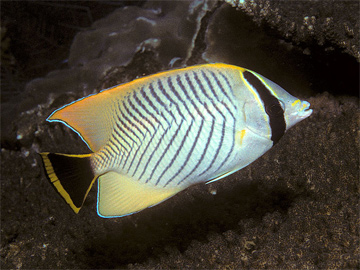Widespread butterflyfish may go extinct due to global warming, pollution
Widespread butterflyfish may go extinct due to global warming, pollution
mongabay.com
February 25, 2008
|
|
The Chevroned Butterflyfish, a colorful fish found in tropical oceans around the world, faces extinction due to overexploitation, pollution and climate change, report researchers writing in the journal Behavioural Ecology and Sociobiology. Despite its widespread distribution, the species could be doomed by its specialized feeding habitats: the Chevroned Butterflyfish (Chaetodon trifascialis) feeds on only one type of coral.
“The irony is that these butterflyfish are widespread around the world, and you’d have thought their chances of survival were pretty good,” said lead author Morgan Pratchett of the ARC Centre of Excellence for Coral Reef Studies and James Cook University. “But they only eat one sort of coral — Acropora hyacinthus — and when that runs out, the fish just disappear from the reef.”
In trials with captive fish, Pratchett and Michael Berumen of Woods Hole Oceanographic Institution found that if deprived of Acropora hyacinthus, the Chevroned Butterflyfish would starve instead of eating a mixed diet of corals.
 Chaetodon trifascialis, Chevron butterflyfish. Photograph by Bernard E. Picton |
“We call these kinds of fish obligate specialists. It means they have a very strong dietary preference for one sort of food, and when that is no longer available, they go into decline. We still don’t have a satisfactory scientific explanation for this, as it seems like rather a risky tactic in evolutionary terms — but it must confer some advantage provided enough of its preferred food is available,” explained Pratchett.
The Chevroned Butterflyfish’s plight is that Acropora hyacinthus coral is highly vulnerable to predation by crown-of-thorns starfish — infestation by which is worsened by sewage discharge and agricultural runoff — and bleaching from high ocean temperatures (above 32°C).
“Although extremely widespread, the Chevroned butterflyfish may be at considerable risk of extinction following ongoing degradation of coral reefs around the world, because the coral itself is exceptionally vulnerable,” said Pratchett. “It is estimated that up to 70 per cent of the world’s coral reefs are now badly degraded, which usually involves the loss of this particular coral… To make matters worse, butterflyfishes are one of the main families of coral reef fishes being targeted by aquarium collectors. However, the specialized coral-eaters are clearly not suitable for keeping in aquaria – and often die because they cannot obtain their main food source.”
Pratchett says the Chevroned Butterflyfish is an example of the type of species most at risk of extinction due to climate change and human activities. Marine ecosystems may be particularly vulnerable to small changes in habitat.